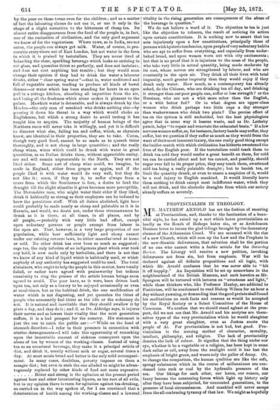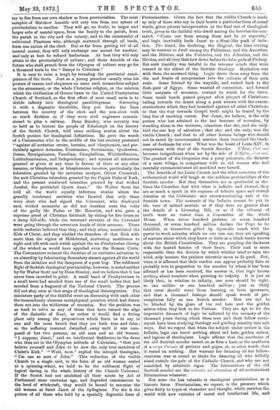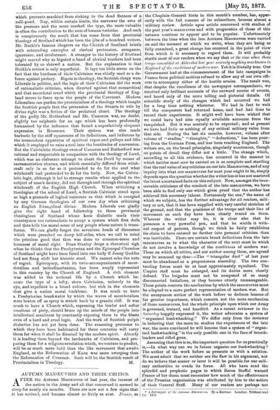PROVINCIALISM IN THEOLOGY.
NIR. MATTHEW ARNOLD has set the fashion of sneering at Provincialism, and, thanks to the fascination of a beau- tiful style, he has raised up a sect which hates provincialism as loudly as the Bench of Bishops hates sin, or as Archdeacon Denison loves to intone the glad tidings brought by the damnatory clauses of the Athauasian Creed. We are menaced with the rise of a new Church, which will sum up the Law and the Prophets in the new-Sinaitic deliverance, that salvation shall be the portion of no one who cannot write a feeble article for the Saturday Review. The Liturgy will receive a new petition, invoking deliverance not from sin, but from emphasis. War will be declared against all definite propositions and all logic, with which Mr. Arnold confesses that he was never able to "hit it off happily." An Inquisition will be set up somewhere in the neighbourhood of the British Museum, and such heretics as Mr. Spurgeon will be tortured with lectures on "sweetness and light," while those thinkers who, like Professor Huxley, are addicted to Positivism, will be condemned to read Bishop Wilson for an hour a day without yawning, or demanding that the good prelate shall found his meditations on such facts and reasons as would be accepted by the Royal Society or a Select Committee of the House of Commons. We confess that we should stand aghast at the pros- pect, did we not see that Mr. Arnold and his acolytes are them- selves types of the very provincialism which he would slaughter with a very great slaughter, even as Joshua smote the people of Ai. For provincialism is not bad, but good. Pro- vincialism is the nursing mother of character, morality, intellect, philosophy, and religion. The lack of provinciality denotes the lack of colour. It signifies that the thing under our eye, whether it be a vegetable or a religion, has been kept in some dark cellar or cell, away from the sunlight until it has lost the emphasis of bright green, and wears only the pallor of decay. Or, to change the comparison, the human qualities are like the soft, spongy substances which in the course of millenniums are con- densed into rock or coal by the hydraulic pressure of the sea. Our likings for each other, our hates, our reason, our fancy become the consuming forces which light up history only after they have been subjected, for uncounted generations, to the pressure of local circumstances. And mankind will never escape from the all-embracing tyranny of that law. We might as hopefully
try to flee from our own shadow as from provincialism. The most seraphic of Matthew Arnolds will only run from one sphere of provincialism to another. They will go, no doubt, to larger and larger orbs of mental space, from the family to the parish, from the parish to the city and the county, and to the community of cultivated Pharisees who, although scattered through all lands, form one nation of the elect. But so far from getting rid of all mental accent, they will only exchange one accent for another, and only at best be refined barbarians. At best they will only attain to the provinciality of culture ; and those Arnolds of the future who shall preach from the Olympus of culture may go for a thousand texts to the " Essays in Criticism."
It is easy to raise a laugh by revealing the provincial omni- potence of the Sects. Just as a young preacher usually tries his powers of reason and eloquence on some such tremendous subject as the atonement, or the whole Christian religion, or the relation which the civilisation of Greece bears to the United Presbyterian Church of Scotland, so the first effort of most small sects is to divide infinity into theological parallelograms. Surveying it with a dogmatic theodolite, they put down the lines between the country of the elect and the non-elect with as much decision as if they were civil engineers commis- sioned to plan a railway. Dean Stanley, who recently was so bold as to lecture the people of Edinburgh on the history of the Scotch Church, told some striking stories about the Scotch passion for theological definitions. He gave the words of a Cameronian who in the middle of the last century protested "against all sectarian errors, heresies, and blasphemies, and par- ticularly against Arianism, Erastianism, Socinianism, Quakerism, Deism, Bourignianism, Familism, Campbellism, Whitfieldianism, Latitudinarianism, and Independency ; and against all toleration granted or given at any time in favour of these or any other heresies, or blasphemies, or blasphemous heretics, particularly the toleration granted by the sectarian usurper, Oliver Cromwell ; the anti-Christian toleration granted by the Popish Duke of York, and the present continued toleration granted by that wicked Jezebel, the pretended Queen Anne." Sir Walter Scott has told all the world equally ludicrous stories about the grandly intolerant sectaries who fancied that only those were elect who had signed the Covenant, who disobeyed such wicked monarchs as did not hearken unto the voice of the godly Mr. Paden or Mr. Renwick, and who gave a supreme proof of Christian fortitude by sitting for five hours on a damp hill-side, while the reverend servants of the Covenant were going through the seventeen heads of their sermons. Those noble sectaries believed that they, and they alone, constituted the Kirk of Christ, and they wielded the thunders of that Kirk with more than the vigour of Hildebrand, scattering anathemas to right and left with such wrath against the an-Presbyterian throng of the wicked as would have appalled even the Roman Curia. The Covenanters reduced the doctrine of an exclusive salvation to an absurdity by fulminating damnatory clauses against all the world from the isolation and the dampness of a peat bog. The sublimest flight of Scottish theological provinciality, however, is noted neither by Sir Walter Scott nor by Dean Stanley, and we believe that it has never been recorded in print. A small band of Presbyterians in a small town had seceded from one of the small bodies that had seceded from a fragment of the National Church. The process did not stop even at that stage of theological disintegration. The miniature party of the faithful went on discussing with each other the tremendously abstruse metaphysical question which had drawn them out into the wilderness of secession. But the problem was as hard to solve as any of those that have turned the edge of the dialectic of Kant, or rather it would find a fitting place only among the propositions which force us to say in one and the same breath that they are both true and false ; so the suffering remnant dwindled away until it was com- posed of but two persons, an old man and an old woman. "I suppose, Janet," said an intellectual Sadduccee to the dame who thus sat in the Olympian solitude of Calvinism, "that you believe yourself and John to be now the only true members of Christ's Kirk." " Weel, mon," replied the intrepid theologian, "I'm nae so sure o' John." This reduction of the visible Church to a single unit, in the form of an old woman seated at a spinning-wheel, we hold to be the sublimest flight of logical daring in the whole history of the Church Universal. If the Scotch had not abolished all their saints by Act of Parliament some centuries ago, and degraded canonisation to the level of witchcraft, they would be bound to canonise the old woman as Saint Janet of the Syllogisms. For she is the patron of all those who hold by a specially dogmatic form of
Protestantism. Given the fact that the visible Church is made up only of those who say in their hearts a particular form of sound words, given private interpretation as the final test of theological truth, given to the faithful who dwell among the heretics the com- mand, ' "Come out from among them and be ye separate," and logic inevitably leads Janet to a Sinai-like peak of isola- tion. The timid, the doubting, the illogical, the time-serving may be content to dwell among the Philistines, and the Amorites, and the Hittites, and the Perizzites, and the Jebusites, and the Hivites, and all they that bow down before the false gods of Prelacy. But such timidity was hateful to the intenser minds that were- trained in the school of the Scottish theology. Hesitation was with them the accursed thing. Logic drove them away from the din and bustle of compromises into the solitude of their own souls. Some fainted by the wayside, and rushed back to the flesh-pots of Egypt. Some wearied of contention, and formed little outposts of secession, content to watch for the dawn. Some small bands passed picquet after picquet of Christians, toiling towards the desert along a path strewn with the excom- munications which they had launched against all other Christians, so that the way towards Gospel truth might be traced by the long line of smoking curses. But Janet, we believe, is the only person who has attained to the last honours of secession, by standing alone in the universe, conscious that she, and she only, held the one key of salvation ; that she, and she only, was the visible Church ; and that to all other human beings who should not be saved by uncovenanted mercies there remained the black- ness of darkness for ever. What was the boast of Louis XIV. in comparison with that of the Scotch Seceder. L'Etat, c'est nzoi becomes insignificant when set by the side of L'Eglise, c'est moi. The greatest of the Gregories was a puny potentate, the dictator of a mere village, in comparison with an old woman who had. mentally excommunicated all mankind save herself.
The Arnolds of the Latin Church and the other countries of the ecclesiastical world will laugh at the sublime provincialism of the Scottish seceder. But they themselves are as provincial as she. Since the Churches deal with what is infinite and eternal, they are as much a speck in the expanse of infinite space and eternal duration as the Calvinistic and excommunicating unit of the Scottish town. The counsels of the Infinite cannot be put to the vote of mitred mortals as if they were no greater than the details of a Licensing Bill, or as if the tribunal of truth were no vaster than a Committee of the whole House. When seven hundred prelates, or seven hundred thousand, or seven hundred million declare the Pope to be infallible, or themselves gifted by Apostolic touch with the power to work miracles which no one can see, they are speaking of matters about which they know as little as a black-beetle knows about the British Constitution. They are peopling the darkness with the heated fancies of their brain. Their task is more respectable than the devices by which witches tried to raise the wind, only because the prelates sincerely mean to do good. But, when it is affirmed that their verdict can appear probably false or- probably true in proportion to the number by whom it has been affirmed or has been received, the answer is, that logic knows nothing about numbers when pointing to in4nity. It is just as likely that, in relation to infinity, one man should be right, as one million or one hundred million ; just as likely that error should come from learning as from ignorance, and that a thousand bishops should speak words of pre- sumptuous folly as one Scotch seceder. Men are apt to be blinded by the glare of the red hats and the golden mitres when they look to the Vatican. They are apt to let the imperative demands of logic be softened by the memory of the thousand years during which these men and their fellow sooth- sayers have been studying theology and guiding sanctity into safe- ways. But we repeat that when the subject under review is the Infinite, logic can know nothing about red hats, golden mitres, and legions of theologians. Logic affirms that the anathema of the old Scottish seceder rested on as firm a basis as the anathema of a corps d'arnzie of prelates and popes, or, in other words, that it rested on nothing. Her warrant for damning all her fellow- creatures was as sound as theirs for damning all who wilfully stand outside the pale of the Catholic Church, and who are not sanctified by cabalistic signs. The fulminations of the old Scottish seceder are the reductio ad absurdum of all ecclesiastical fulminations whatever.
But none the less valuable is theological provincialism as a historic force. Provincialism, we repeat, is the pressure which gives fixity to types of character and thought, which enriches the world with new varieties of moral and intellectual life, and
which prevents mankind from sinking to the dead flatness of a mill-pond. Nay, within certain limits, the narrower the area of the pressure and the more marked the type, the more valuable is often the contribution to the sum of human varieties. And such is conspicuou.sly the result that has come from that provincial theology of Scotland which has been the jibe of a hundred writers. Mr. Buckle's famous chapters on the Church of Scotland bristle with astounding examples of clerical pretension, arrogance, ignorance, and intolerance. A stranger to the history of Scotland might marvel why so bigoted a band of clerical teachers had been tolerated by so shrewd a nation. But the explanation is that Buckle's review is only superficial. It lays too little stress on the fact that the hardness of their Calvinism was chiefly used as a de- fence against prelacy. Bigots in theology, the Scottish clergy were Liberals in politics, and the logic of their Calvinism did the work of rationalistic criticism, when directed against that monarchical and that sacerdotal creed which the provincial theology of Eng- land strove to force upon the people of the Covenant. Modern Liberalism can pardon the provincialism of a theology which taught the Scottish people that the pretension of the Stuarts to rule by divine right was a fiction of the prelatical closet. The theology of the godly Mr. Rutherford and Mr. Cameron was, no doubt, slightly too sulphuric for an age which has been profoundly humanised by the influence that found a superlatively eloquent expression in Rousseau. Their system was also made barbaric by the stiff squareness of its definitions, and ludicrous by the tremendous apparatus of spiritual ropes and pulleys and lifts which it employed to raise a soul into the beatitudes of conversion. But the Calvinistic theology even of Cameron and Rutherford was rational and respectable in comparison with the theology of Laud, which was an elaborate attempt to cheat the Devil by means of sacramentarian charms, and which essentially differed from witch- craft only in so far as it pretended to do for the soul what witchcraft had pretended to do for the body. Now, the Calvin- istic logic, although it led to strange results when applied to the subject of man's destiny, did cut through and through the spiritual witchcraft of the English High Church. When criticising a theologian of the school of Laud, a Scottish Calvinist stood upon as high a pinnacle of logical eminence as that which is occupied by any German theologian of our own day when criticising an English Evangelical divine. Modern Liberals can gladly _give the right hand of fellowship to those provincial theologians of Scotland whose keen dialectic made their countrymen too rationalistic to accept a system which first dulls and t4hen kills the moral sense of any people whose nature it trans. forms. We can gladly forget the seventeen heads of discourses which were preached on damp hill-sides, when we call to mind the priceless good that thus was done to common-sense and keenness of moral sight. Dean Stanley drops a rhetorical sigh when he thinks that the Presbyterian and the Episcopal Churches of Scotland might have been fused into one body if Jenny Geddes had not flung aloft her historic stool. We cannot echo the note of regret. Episcopacy, with its twin-accompaniments of sacer- dotalism and latitudinarianism, has been amply represented in this country by the Church of England. A rich element was added to the national life by a Church which be- came the type of a lofty, stern Calvinism, unlovely to the eye, and repellent to a broad culture, but rich in the elements that give a nation moral backbone. It was much to have a Presbyterian breakwater by which the waves of sacerdotalism were beaten off as spray is struck back by a granite cliff. It was much to have a Church which, repressing the louder and softer emotions of piety, should brace up the minds of the people into intellectual manliness by constantly exposing them to the blasts even of a hard and cruel logic. And the work of Scottish pulpit dialectics has not yet been done. The reasoning processes to which they have been habituated for three centuries will carry them far when it shall be directed by the modern spirit. Already it is leading them beyond the landmarks of Calvinism, and pre- paring them for a religious revolution which, we venture to predict, will be as much more bold than the like movement that awaits England, as the Reformation of Knox was more sweeping than the Reformation of Cranmer. Such will be the Scottish result of




































 Previous page
Previous page